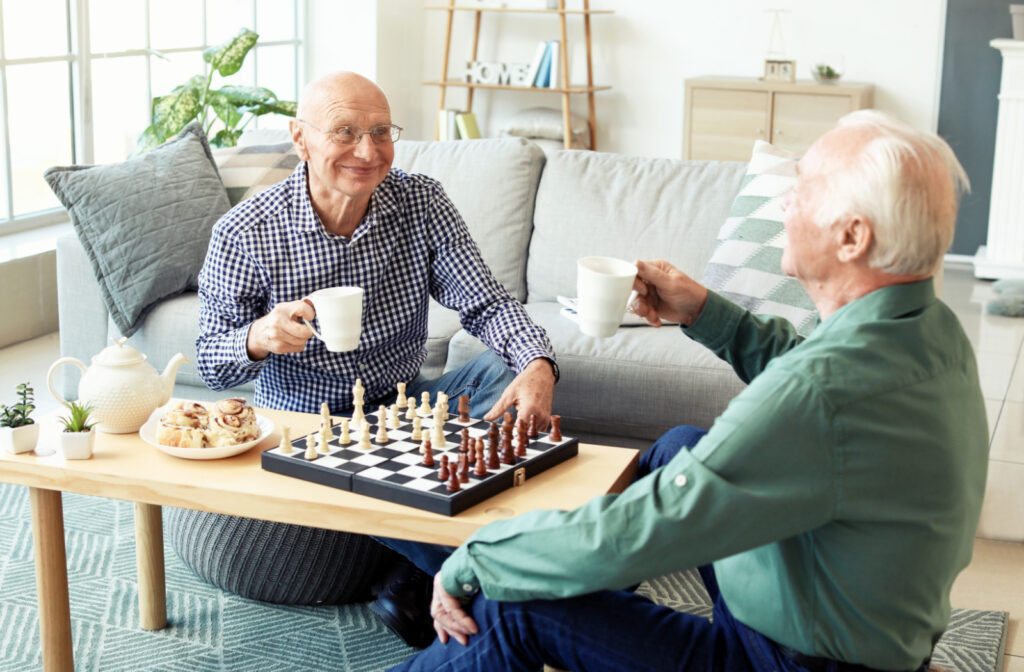Brain games have been around for a long time, from crosswords, puzzles, and sudoku to digital problem-solving training and memory matching. These games have gained popularity with health claims ranging from improved memory retention to staving off cognitive decline. But do they truly live up to their hype?
Whether digital or not, brain games, alongside healthy lifestyle choices, have emerged as a promising training tool for enhancing various aspects of cognitive function, including memory.
Many older adults can face challenges maintaining proper cognitive function. That’s why many senior living communities offer engaging and enriching activities and events to help residents achieve a high quality of life and function.
Understanding Memory
Before looking deeper into the science behind brain games, it’s essential to understand memory and its complexities. Memory is not a single entity. Instead, it’s a collection of processes that involve encoding, storing, and retrieving information. These processes are intertwined and can be influenced by various factors, including genetics, lifestyle, and cognitive engagement.
Brain Games vs. Brain Training
There is an important distinction between brain games and brain training. Brain games are things you do for leisure and can be considered the same as going outside to play. Examples of brain games are Sudoku, crosswords, quizzes, and word problems.
Brain training, on the contrary, can be thought of as going to the gym for your brain. Brain training is exercising the brain to increase cognitive abilities such as memory, concentration, attention, and brain efficiency.
Which Should You Use?
With the rise of mobile apps and online platforms, the options for brain games have become more abundant and easily accessible for individuals seeking to enhance their cognitive abilities. While brain games may be more akin to having fun and playing outdoors, they have been found to still supply cognitive benefits towards improving memory, reasoning skills, and brain efficiency. Therefore, engaging in brain training and brain games can’t hurt.
The Memory Myth
Proponents of brain games argue that consistent engagement can lead to improvements in working memory and attention span. These games often provide a controlled environment for individuals to practice specific cognitive skills.
However, the transferability of these skills to real-life scenarios remains a topic of debate. In other words, becoming a master at a brain game doesn’t necessarily equate to improved memory in daily life, but rather, training your brain to help fend off cognitive decline.

The Science Behind Brain Games and Memory
Research on the efficacy of brain games for memory enhancement has produced conflicting results. Some studies suggest that engaging in cognitively challenging activities can positively impact memory function, especially in older adults and children. These activities can promote neuroplasticity—the brain’s ability to reorganize itself by forming new neural connections.
However, other research highlights the limitations of brain games. A 2019 study found that while brain training games can improve in the specific tasks they target, these improvements often do not extend to broader cognitive abilities like memory.
The Importance of a Healthy Lifestyle For Memory
The relationship between the mind and body is well-established. A healthy lifestyle doesn’t just promote physical well-being; it also directly impacts cognitive function, including memory. When you prioritize your body’s health, you’re also investing in the optimal functioning of your brain.
Lifelong Learning
Arguably, the best approach to memory enhancement involves lifelong learning and cognitive engagement. Instead of fixating solely on brain games, individuals can focus on continuous learning, adopting new hobbies, and engaging in activities that stretch their cognitive abilities. Learning a musical instrument, practicing a new language, or exploring topics outside one’s comfort zone can all contribute to enhanced memory function.
Embracing a Memorable Life
While brain games might offer cognitive boosts and entertainment, they are not a guaranteed path to substantial and lasting memory enhancement. The human brain is a complex organ influenced by various factors, including genetics and lifestyle choices.
Engaging in various cognitive activities, adopting a healthy lifestyle, and challenging oneself intellectually through lifelong learning remain some of the most promising ways to support memory function. While brain games can be a part of your cognitive exercise routine, remember that The Lodge At Historic Lewes is here to help unlock your potential by offering an environment full of social connections, activities, and events–there is something for everyone! Experience the perks of living at The Lodge At Historic Lewes—schedule a visit today.




